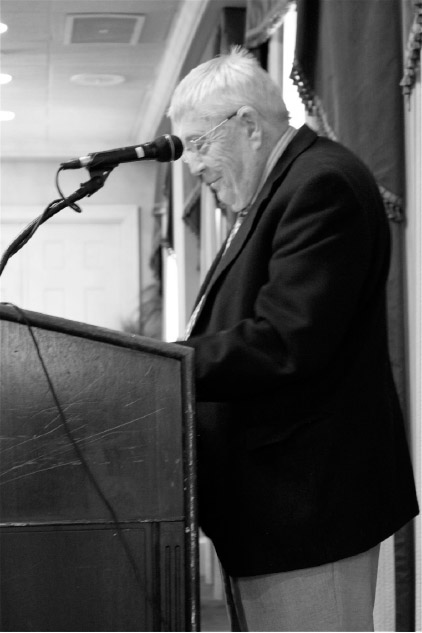Thomas H. Landess, R.I.P. At 80 Tom was still producing every day more than a day’s worth of versatile work. His sudden passing in January struck like an unexpected calamity that portends the end of an era. We lost not only the truest of friends, but a true gentleman, a true man of letters, and almost the last of the actual students of the Vanderbilt Agrarians.
One of Tom’s many memorial tributes refers to him as an unsung hero. Quite right. Nearly every comment on his passing uses the word “gentleman.” Indeed, his charm, generosity, quietly humane disposition, and firmness of principle were a model of the best of what a Southern gentleman can be. Unsung, but liked and admired by everyone who encountered him personally in a long and active career. Though his productivity was prodigious, Tom never seemed ruffled and always had time, patience, and openness for a friend, a promising young person, or a worthwhile cause.
He began as a literary scholar. In 1982 he resigned as dean and professor of English at the University of Dallas and returned to South Carolina to make a living as a writer, at which, after a time, he succeeded. A bibliography of Landess’s published writings, if one could be constructed, would doubtless fill a small book. Truth to tell, the primary motive of most of us writers is vanity—to see our names and work in print. Tom was the model of a man of letters, a nearly extinct breed on both shores of the Atlantic. He was gifted with something to say and the ability to say it well on every subject and in every genre, with seemingly unruffled ease. When a collection of my short pieces was published, Tom wrote a flattering introduction. I commented in the Acknowledgments, most sincerely, that it was really his collected essays that should be published rather than mine. I believe he delighted in his craft without any of the vanity that usually accompanies authorship, enjoying the exercise of his consummate skill without any self-promotion or pretension that his words were imperishable. He wrote hundreds of articles—scholarly and popular—and two dozen or more books, “some of them,” as the tag of his Chronicles pieces reads, “under his own name,” for he was in great demand as a ghostwriter.
Among the many volumes he wrote for others was the autobiography of the Rev. Mr. Ralph David Abernathy. The Southern agrarian and the civil-rights leader became friends, something that perhaps can only be understood by a Southerner. Whether Tom had anything to do with Abernathy’s conservative turn I do not know. I do know that Abernathy was willing to tell revealing parts of the Martin Luther King, Jr., story that the publisher was unwilling to risk giving to the public.
We cannot here undertake to tell the whole of Tom Landess’s literary and political life, but for the record, one episode needs to be recorded. As Mel Bradford’s colleague and closest friend, he was intimately acquainted with the National Endowment for the Humanities debacle at the beginning of the Reagan administration. His recollections of this are recorded in short talks now in the archives of The Rockford Institute, the Abbeville Institute, and the Ludwig von Mises Institute. These ought to be heard by anyone who wants really to understand what the “Reagan Revolution” did to our country.
Tom and I met for lunch once a week at the Cajun’s or Maurice’s Barbecue. He always had wry observations on the arcane and tawdry doings of South Carolina politicians and a delightful reminiscence of some earlier happening. I can only say to Mary Beth, his daughters, son, and grandson that I cannot miss Tom as much as you will, but there is an empty space in my life and that of many others that will not be filled while we remain in this earthly realm.

Leave a Reply